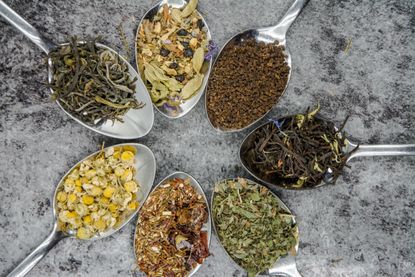Using tea leaves in the garden – to boost your plants' health
Find out how using tea leaves in the garden can benefit plants, compost and mulch – and even deter pests


We’re all for recycling, especially when it benefits our gardens. The latest discovery we’ve made? Using tea leaves in the garden can lead to healthier plants. Of course it can – faded memories suddenly return of parents emptying tea leaves over bountiful rose bushes.
See: Garden ideas – inspiration and ideas for outdoor spaces
But tea leaves are not just good for plants – they can boost compost and deter pests, too. We investigate the upsides – and downsides – of using tea leaves in the garden.
Using tea leaves in the garden
Plant fertilizers contain, among other ingredients, nitrogen, which encourages healthy leaf growth.
Tea leaves also contain nitrogen – but much more than you’ll find in plant fertilizers. There is also potassium and phosphorus in tea, plus tannic acid – which not all plants love. Tea contains aluminum, fluorine and manganese, too, which in high doses can slow plant growth.
This means that stewed tea could harm plant growth, particularly if they don't like acidic soil. Instead, used but drained tea leaves are best added to compost rather than soil or directly over plants. There, they will increase nutrient and oxygenation levels in the compost.
It’s important to know that not all plants like tea leaves, whether poured over them directly or via compost you’ve made up – the tannic acid in them can lower the soil’s pH and increase its acidity.
So, if you are growing plants that like acidic conditions – there’s a list below – you can safely use tea leaves beneficially. But if you are growing plants that prefer alkaline conditions – again, a list below – you need to be careful. Keeping an eye on your soil’s pH levels is all important. Yellowing leaves can be a sign of acid levels being too high, so keep an eye on this.
Tea leaves are usually removed from tea bags and the bags discarded appropriately before being used in the garden. However, some gardeners like to use paper (compostable) tea bags, however, as a mulch or drainage layer.
See: Using coffee grounds in the garden – extraordinary ways to boost plant growth
Another thing to note: it is more harmful than beneficial to use tea with milk or sugar in it in the garden: sugar will make plants wilt, milk will encourage mold growth.
Finally, over-fertilizing plants isn’t good for them, so throwing tea daily over plants – even ones that like acidic soil – might not be beneficial. Instead, look to add tea leaves to compost, as just one of its many ingredients.
Using tea leaves in compost
Used tea leaves added to compost boosts nitrogen levels which helps break down other things you have added, and encourages decomposing bacteria. These can be added as loose leaves or as bags – assuming the bags are paper and don’t have staples or string attached to them.
Using tea leaves for pot plants
As with garden plants, acid-loving pot plants will benefit from used tea leaves being added to their soil – although as we said above, we would add it to compost as part of a balance of ingredients. See below for a full list of plants that like tea leaves.
Using tea leaves to prevent weeds
Tea leaves won’t prevent weeds, but use them in mulch (indeed use any mulch) and weeds are less likely to be able to establish.
Using tea leaves to deter pests and insects
If your garden plants are being destroyed by pests, there is anecdotal evidence that you can use tea leaves and tea to deter those that hate the smell – mice, cats and some insects – by either scattering the leaves around the roots of the plant or by spraying cooled tea on to the plant.
Using tea leaves to prevent fungus
Spraying cold tea on to leaves can help ward off fungal diseases that some plants can suffer from.
Which plants like used tea leaves?
You can use tea leaves in the garden on plants that do well with a higher level of acid in the soil. Tea leaves won’t do a better job than shop-bought fertilizers, and are often better added to a balanced compost rather than directly to the plant.
This is a basic list of plants that will benefit from tea leaves in their soil:
- African violets
- Azalea
- Begonia
- Selected berry fruits
- Camelia
- Daffodils
- Easter lily
- Ferns
- Heather
- Selected herbs
- Blue hydrangea
- (Some) orchids
- Oxalis
- Philodendron
- Poinsettia
- Rhododendrons
- Roses
- Rubber plant
- Shrubs
- Spider plants
- Tomatoes
- The majority of vegetables.
See: Using eggs in the garden – the natural remedy for transforming your flower beds
Which plants don’t like used tea leaves?
Plants that need an alkaline environment or neutral pH will not benefit from having tea leaves added to their soil. A balanced compost – that includes some tea leaves but other beneficial ingredients – shouldn’t affect these plants dramatically, but keep an eye on wilted plants and those with yellow leaves, and check your soil’s pH levels if you have any concerns.
This is a basic list of plants that won’t benefit from tea leaves:
- Baby’s breath
- Boston ivy
- Cacti
- Carnation
- Chrysanthemum
- Dahlia
- Daisies
- Geranium
- Hibiscus
- Pink hydrangeas
- Iris
- Marigold
- Peony
- Poppy
- Sunflowers.
Sign up to the Homes & Gardens newsletter
Decor Ideas. Project Inspiration. Expert Advice. Delivered to your inbox.

Lucy Searle has written about interiors, property and gardens since 1990, working her way around the interiors departments of women's magazines before switching to interiors-only titles in the mid-nineties. She was Associate Editor on Ideal Home, and Launch Editor of 4Homes magazine, before moving into digital in 2007, launching Channel 4's flagship website, Channel4.com/4homes. In 2018, Lucy took on the role of Global Editor in Chief for Realhomes.com, taking the site from a small magazine add-on to a global success. She was asked to repeat that success at Homes & Gardens, where she also took on the editorship of the magazine. Today, Lucy works as Content Director across Homes & Gardens, Woman & Home, Ideal Home and Real Homes.
-
 Bobby Berk's recent project is the perfect blend of sophisticated yet playful – we take a look inside
Bobby Berk's recent project is the perfect blend of sophisticated yet playful – we take a look insideThe interior design icon's partnership with Tri Pointe Homes has produced some truly stunning spaces. Here's a peek at one of his latest reveals
By Abby Wilson Published
-
 Magnolia Market is having a 20% off sale so we can all celebrate Joanna Gaines’ birthday
Magnolia Market is having a 20% off sale so we can all celebrate Joanna Gaines’ birthdayChip and Joanna Gaines’ lifestyle brand, Magnolia Market, is having a huge sale for Joanna’s birthday
By Nikhita Mahtani Published